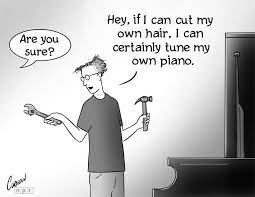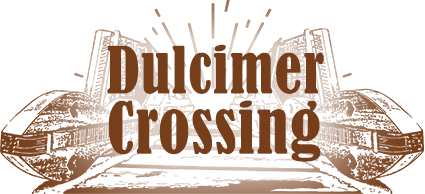Why Tune?

You picked up your dulcimer to run through a couple of tunes. There’s no one else listening. No one will care if your instrument is slightly out of tune. And you only have a few minutes to practice. Why bother to tune for that? This thought came to my mind a few weeks back. I had about 15 minutes of free time before I had to leave, and I wanted to start reviewing my patriotic repertoire – getting ready for impromptu performances for Memorial Day, July 4th, and Labor Day. America the Beautiful, Star-Spangled Banner, and God Bless America are always included in my go-to list of tunes to play during the summer.
Now you know tuning a hammered dulcimer takes a good while, and I have a wonderful MasterWorks instrument. It holds its tuning quite well, but eventually the bottom strings will go flat about a quarter tone, and the higher strings go sharp about a quarter tone. Many folks wouldn’t even notice the difference.
BUT I DO. And so I stopped right in the middle of playing America the Beautiful, and took the time to tune. Here’s why.
- It didn’t sound right. No matter how well I can play America the Beautiful, it just doesn’t “sound right” when my dulcimer is out of tune – even by just a little. Same goes when playing my guitar, ukulele, or mountain dulcimer.
- That led to a sloppy technique. Well, maybe this is just me. But since my instrument simply wouldn’t deliver the desired sound even though I was hammering all the right strings, I relaxed and kept moving forward when I hit the wrong strings. BAD decision. I should always stop and hammer out the notes of a difficult section (get the pun?) more slowly, until I can play the measure or phrase correctly.
- Wrong notes might sound right. If you’re a beginner learning an unfamiliar fiddle tune and your instrument is out of tune, you might not even recognize when you strum, pluck, or hammer the wrong note.
- An out-of-tune instrument lowers satisfaction. Even just one string slightly out of tune can cause every chord to sound bad, let alone an entire tune. A beginner might not know WHAT is wrong, but they will know something doesn't sound right. At the end of the practice session, they could feel like they haven't progressed or accomplished much of anything.
- Lowered satisfaction has a negative impact on learning. In other words, if playing your instrument doesn’t give you joy, you’re going to practice less often and for shorter periods of time. If it doesn’t sound good, and it doesn’t feel right, you might put your dulcimer back in its case for another day, instead of practicing for another 10-15 minutes.That’s just the plain truth of the matter.

So that leads to another interesting question. Is it ok to tune by ear, or should you always use an electronic tuner? I think tuning by ear is good ear training, and I often tune my guitar and mountain dulcimer by ear. However, when playing with others, I recommend that you always use the electronic tuner. Otherwise, you might be in tune with yourself, but off by a quarter pitch from everyone else.
Happy tuning!
Categories
- News (8)
- Events (4)
- News (6)
- Events (4)
- subscriber news (233)
- mountain dulcimer (109)
- hammered dulcimer (112)
- uncategorized (6)
- lessons (189)
- mountain dulcimer (198)
- hammered dulcimer (154)
- history (22)
- music theory (40)
- octave (1)
- plagal cadence (1)
- dulci-bro (73)
- fingerpicking (3)
- fingerstyle mountain dulcimer (4)
- nina zanetti (4)
- aeolian (2)
- dorian (4)
- ionian (3)
- lydian (1)
- mixolydian (3)
- modes (2)
- traditional (2)
- tuning (4)
- music education (2)
- NSME (1)
- standards (1)
- drone (3)
- folk alliance (1)
- jonah brody (1)
- koto (1)
- chromatic mountain dulcimer (7)
- sam lee (1)
- scottish folk song (1)
- linda ratcliff (5)
- practice (26)
- chromatic mountain dulcimer (66)
- dulcimercrossing.com (2)
- erin rogers (7)
- building (8)
- black mountain (1)
- jerry read smith (1)
- Joshua Messick (1)
- song of the wood (1)
- don pedi (5)
- fiddle whamdiddle (9)
- miss mcleod (2)
- steve eulberg (30)
- vi wickam (9)
- buying (1)
- choosing (1)
- purchasing (1)
- orphan girl (1)
- copyright (1)
- amplification (2)
- contact pickup (1)
- eulberg (4)
- microphone (2)
- pickup (2)
- berkeley (1)
- colorado (2)
- festivals (4)
- kentucky (1)
- scholarship (1)
- western carolina (1)
- noter (2)
- clubfooted jib (1)
- dgd (2)
- dgd tuning (1)
- special event (31)
- david massengill (2)
- reverse ionian (1)
- chuck boody (1)
- concertina (1)
- deedee tibbits (1)
- dulcimer (7)
- evart (1)
- evart funfest (1)
- linda foley (1)
- michigan (1)
- original dulcimer players club (1)
- fingerstyle (11)
- gebhard woods (1)
- technique (1)
- harmonics (1)
- dan delancey (2)
- june apple (1)
- linda thomas (3)
- modal (1)
- expression (1)
- playing expressively (1)
- dulcimer pledge (1)
- christmas (2)
- nativity (1)
- DAC (2)
- minor more (1)
- mississippi sawyer (1)
- holiday (5)
- joy to the world (1)
- jingle bells (1)
- reverse ionion (1)
- hand independence (1)
- hand separation (1)
- lullabye of muffe (1)
- tina gugeler (1)
- absolute beginner mountain dulcimer (1)
- beginner (2)
- mountain (3)
- string-side up (1)
- absolute beginner hammered dulcimer (1)
- blog (2)
- dulcimercrossing. (1)
- topics (1)
- blues (4)
- resonator (4)
- dulcimer orchestra (2)
- kitty puss (1)
- mike clemmer (1)
- noter style (2)
- jam survival (7)
- butch ross (3)
- looping (1)
- intro (4)
- neal hellman (4)
- erin mae lewis (9)
- rehearsal (3)
- italian (1)
- lauda (1)
- irish (1)
- slipjig (1)
- rhythm (2)
- robert force (2)
- tuner (1)
- exercises (1)
- scales (1)
- devotions (3)
- hark advent (1)
- the glad sound! (1)
- chords (3)
- chromatic (4)
- erin (1)
- theory (7)
- advent (5)
- preparation (4)
- stir up (1)
- appalachia (4)
- hillbilly (1)
- mountains (1)
- traditional music (1)
- dampers (1)
- hearts of the dulcimer (3)
- patricia delich (2)
- wayne jiang (2)
- appalachian (1)
- John Jacob Niles (1)
- Live Events (28)
- Premium Level Membership (2)
- habits from the muse (1)
- progress (5)
- support (1)
- Anna Muckova (1)
- cimbalom (1)
- CWA (1)
- Czech Republic (1)
- Magdalena Muckova (1)
- nonsuch (1)
- Slovak Republic (1)
- podcast (1)
- aubrey atwater (2)
- jean ritchie (2)
- log-in (1)
- update (1)
- lucky (1)
- performance (8)
- preparing (1)
- study (1)
- dulcimers (1)
- wendy songe (2)
- bluegrass (2)
- growth (1)
- resolutions (2)
- risks (1)
- capo (1)
- snark (1)
- fiddle (61)
- criticism (2)
- judy klinkhammer (1)
- miles davis (2)
- wrong note (1)
- live and let live (1)
- style (1)
- barlow knife (1)
- old school old-time (2)
- marie kirby (1)
- bass mountain dulcimer (1)
- elaine conger (1)
- larry conger (1)
- practice smarter (5)
- musical journey (1)
- piano (1)
- calm (1)
- dog (1)
- su la li (1)
- bluebird cafe (1)
- inspiration (3)
- new input (2)
- trust (1)
- practice space (2)
- quite (1)
- how to practice (6)
- you are what you practice (1)
- workshop (5)
- rich chords (2)
- kaitlin pabo-eulberg (1)
- hooked on dulcimers (1)
- humor (1)
- blue water thinking (1)
- creativity (2)
- environment (2)
- original tunes (1)
- 1+ fret (1)
- chopin (1)
- classical (1)
- assessment (1)
- skill levels (1)
- waltz (1)
- caledonian club (1)
- ensemble (1)
- group (1)
- dulci-tune (1)
- tuning game (1)
- love (2)
- workout (1)
- learning (6)
- teacher (6)
- self-taught (1)
- how long (1)
- jam sessions (6)
- learn to play (1)
- strategies (2)
- fariña (1)
- mimi (1)
- pete seeger (2)
- rainbow quest (2)
- goals (1)
- planning (1)
- backing tracks (6)
- matthew dickerson (2)
- concert (1)
- erin mae (2)
- guitar (5)
- deborah hamouris (3)
- dj (2)
- freight and salvage (1)
- classic (1)
- licks (1)
- rock (1)
- berkeley dulcimer orchestra (1)
- premiere (1)
- banjo (1)
- frank proffitt (1)
- frank warner (1)
- tom dooley (1)
- baker (1)
- binding (1)
- blue lion (1)
- bob (1)
- gluing (1)
- janita (1)
- live (1)
- tips (1)
- spouse (1)
- amplified (1)
- DI box (1)
- digital interface (1)
- sound reinforcement (1)
- 2nd Set Concert (2)
- contest (1)
- flash mountain dulcimer brigade (2)
- JimJim & the FatBoys (1)
- Pecan Grove (1)
- walnut valley festival (2)
- winfield (1)
- wvfest (1)
- thinking (1)
- case (1)
- cross-legged (1)
- grip (1)
- safe dulcimer (1)
- sit (1)
- slip (1)
- stand (1)
- stool (1)
- strap (1)
- learn (3)
- mistakes (1)
- successes (2)
- herbie hancock (1)
- improvising (1)
- jazz (2)
- lois hornbostel (2)
- wrong chord (1)
- atlantic (1)
- barbara allen (1)
- frank profitt (1)
- scots-irish (1)
- chord wizard (1)
- diatonic (2)
- equi-distant (3)
- tom strothers (1)
- tool (1)
- busker (1)
- tsimbaly (1)
- ukraine (1)
- ukrainian (1)
- calendar (1)
- schedule (1)
- baritone (1)
- concert window (3)
- katie moritz (1)
- faq (1)
- frequently asked questions (1)
- logged in (1)
- navigation (1)
- old time (1)
- patreon (1)
- shape-note (1)
- special (1)
- carrell (1)
- geoff reeve-black (1)
- malvern (1)
- presnell (1)
- articulations (1)
- chicken reel (1)
- conger (1)
- soldier's joy (1)
- basic level membership (1)
- caring for your instrument (1)
- winter weather (1)
- god rest ye (1)
- rhythmic displacement (1)
- builder (1)
- tam kearney (1)
- toronto (1)
- don neuhauser (1)
- slide (1)
- ashley ernst (1)
- dan and angie landrum (1)
- dpn (1)
- dulcimer players news (1)
- dulcimersessions.com (1)
- maddie macneil (1)
- arkansas traveler (1)
- Mark Alan Wade (2)
- 3d playing (1)
- playing across the strings (2)
- chord symbols (1)
- understanding chords (3)
- dulcimer club (1)
- class (1)
- habits (1)
- skills (1)
- jimmy driftwood (1)
- failures (1)
- hours (1)
- youtube (1)
- arranging (1)
- bill robinson (1)
- cold winter night (1)
- karen mueller (3)
- jig (1)
- DAd tuning (1)
- hyfrydol (1)
- hymn (1)
- 2020 (1)
- premium (1)
- gounod (1)
- hitchcock (1)
- dan evans (1)
- spotted pony (2)
- steveeulberg (1)
- nylon-string (1)
- stephens lutherie (1)
- musical devotions (1)
- award (1)
- fernando sor (1)
- hammered (1)
- understanding (1)
- lent (1)
- leap forward (1)
- power of music (2)
- sharing (1)
- persistence (5)
- Practice (4)
- routine (1)
- tour (1)
- new website (1)
- arrranging (1)
- celtic (1)
- single jig (1)
- mountain dulcimer (3)
- busking (1)
- audio (1)
- playback (1)
- protection (1)
- adaptations (1)
- dulcimer acquisition syndrome (1)
- dulcimer acquisition disease (1)
- contests (1)
- lessons (1)
- identify (1)
- apps (1)
- motivation (1)
- hands (1)
- In Memoriam (1)
- guitar (1)
- archive (1)
- concerts (1)
- mountain dulcimer (2)
- hammered dulcimer (1)
- lessons (1)
- workshops (1)
- self-assessment (1)
- learn (1)
- greek (1)
- mindset (2)

0 comments
Leave a comment
Please log in or register to post a comment